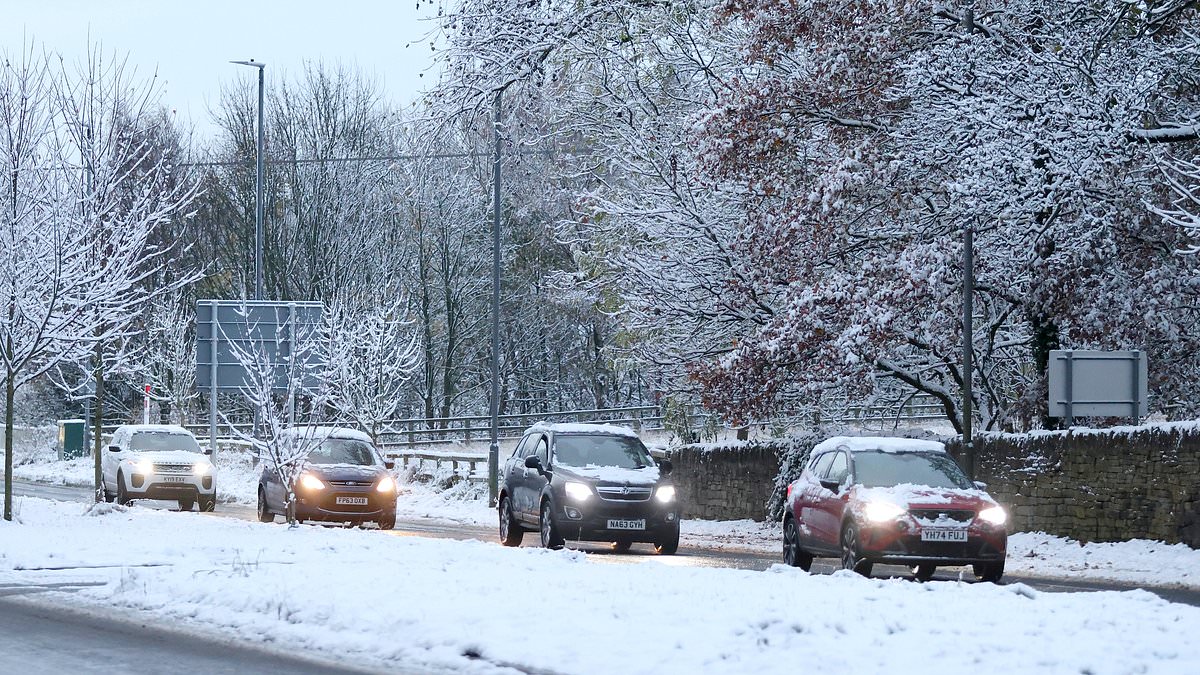With colder weather forecast this week for much of the country, temperatures are beginning to plummet after a mild start to autumn.
Earlier this morning, snow hit London with sleet blanketing the capital as an Arctic chill blasts Britain.
Drivers have reported getting stuck on roads, trains have been cancelled and warnings of more icy weather ahead have been issued as temperatures plunged to -11.2C.
Britons are also being told to expect icy patches on the roads and, as the cold flurries continue, a risk of power cuts and disruption to bus and train services.
On top of this, the temperature reading in the Scottish village of Braemar was described as the coldest Britain has been at this time of the year since 1998.
To combat this weather, millions of people across the UK will now be looking for ways to save money on their energy bills.
From getting your boiler serviced to bleeding your radiator and refilling engine oil, here are some of the most cost effective ways to keep your home warm and car running this winter.
Bleed your radiators
One clever tip if you find your radiators are still stone cold after switching the heating on could be to bleed them, according to an expert from MyBuilder.com.
In many cases, air bubbles might be blocking up the pipework and bleeding a radiator simply involves releasing the valve and letting the excess air out.
The heating does need to be turned off this process and you should use a tissue or rag underneath the valve to catch any water after the air has stopped hissing out, and close the valve as soon as water starts to come out.
Buying new windows
Another major source of heat loss in your home could be your ageing windows.
According to government statistics, 18 per cent of heat loss occurs through windows.
Also, seven per cent of UK homes have no double glazing – and single glazing is far less efficient.
It is worth getting a professional to assess the condition of your windows and consider the cost savings in the long term of upgrading.
Insulation
Good insulation is also brilliant for protecting your home from both hot and cold weather.
Lofts are a good place to start, as this is often where the most heat is lost, so it is well worth investing in.
Thermal curtains
If you don’t already have them, thermal curtains or blinds are also great for temperature control.
They are quick and easy to install with the right tools or the help of a handyman.
They can keep the warmth inside in winter, and keep the sun out in summer.
Get your boiler serviced
The last thing you need when the temperature plummets is to be without heating.
MyBuilder.com statistics recently showed that many UK homeowners are delaying getting their annual service due to the cost of living crisis, but it’s one area you can’t scrimp on.
Getting your boiler serviced ahead of cold weather ensures you will stay warm, and can prevent more costly issues with our boiler in the future.
Check your car’s battery
To keep your car running this winter, you can avert this issue by charging your battery weekly, particularly if it’s older than three years.
Winter’s cold temperatures can slow the chemical processes inside your car battery, reducing its ability to hold a charge.
This reduced capacity can lead to a frustrating dead battery when you need to get on the road.
Use a voltmeter to ensure your battery reaches at least 12.4 volts; if it falls below that, it’s time for a charge.
Inspect your tyres
Colder temperatures can also cause your tyre pressure to drop, which can be dangerous on icy roads.
Inflated tyres can not only improve fuel economy but help you handle your vehicle better in winter conditions.
When checking your legal tread depth, the minimum is 1.6mm but experts recommend changing tyres at a 3mm depth in winter for better grip.
Refill engine oil and coolant levels
Checking and refilling your car’s fluid levels on a regular basis is necessary for smooth and efficient engine operation during winter.
Your coolant level needs to be checked at least once a month to ensure the cooling system can handle freezing temperatures.
Equally, you should check your oil level once a fortnight to ensure it’s between the minimum and maximum markers to prevent engine damage, AVS report.
Keep your fuel tank full
Keeping your fuel tank at least half full during winter can help reduce the chance of condensation forming inside, which can freeze fuel lines.
Running low on fuel can clog the system, meaning the pump and filters can become corroded, potentially blocking fuel which prevents the car from starting.
A full fuel tank avoids the hassle of a fuel-related breakdown in freezing conditions.
